仁爱科普版八年级下Unit 6 Enjoying CyclingTopic 1 I have some exciting news to tell you.同步练习C卷
仁爱科普版八年级下Unit6Enjoying Cycling topic2 How about
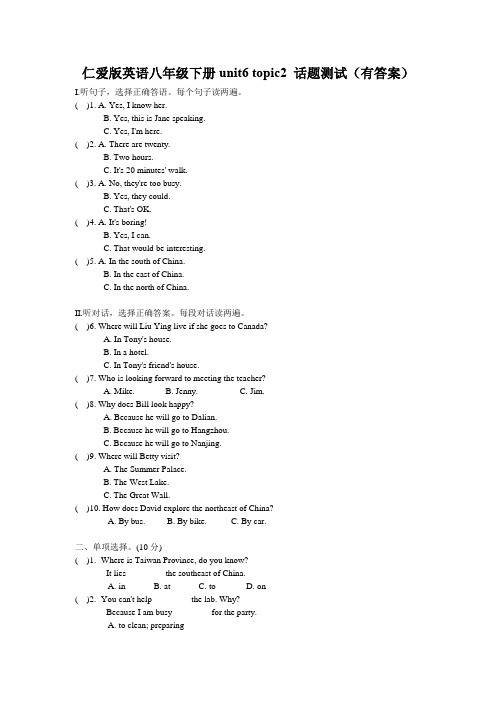
仁爱版英语八年级下册unit6 topic2 话题测试(有答案)I.听句子,选择正确答语。
每个句子读两遍。
( )1. A. Yes, I know her.B. Yes, this is Jane speaking.C. Yes, I'm here.( )2. A. There are twenty.B. Two hours.C. It's 20 minutes' walk.( )3. A. No, they're too busy.B. Yes, they could.C. That's OK.( )4. A. It's boring!B. Yes, I can.C. That would be interesting.( )5. A. In the south of China.B. In the east of China.C. In the north of China.II.听对话,选择正确答案。
每段对话读两遍。
( )6. Where will Liu Ying live if she goes to Canada?A. In Tony's house.B. In a hotel.C. In Tony's friend's house.( )7. Who is looking forward to meeting the teacher?A. Mike.B. Jenny.C. Jim.( )8. Why does Bill look happy?A. Because he will go to Dalian.B. Because he will go to Hangzhou.C. Because he will go to Nanjing.( )9. Where will Betty visit?A. The Summer Palace.B. The West Lake.C. The Great Wall.( )10. How does David explore the northeast of China?A. By bus.B. By bike.C. By car.二、单项选择。
八下英语(最新仁爱版) Unit 6 Enjoying Cycling Topic 3 Section D 课件
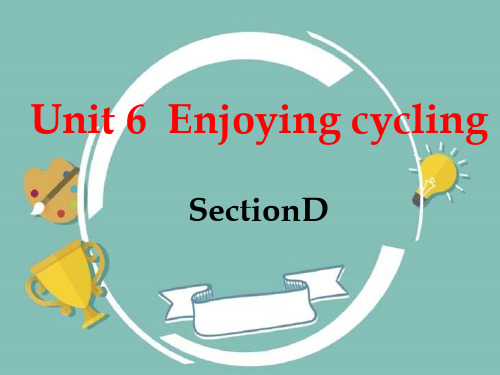
例如:You must stop if the traffic light __is__ (be) red.
3. Please call me if you come back. if 条件状语从句中,主句是祈使句, 从句用__一__般__现__在__时__表示将来。 _主__祈__从__现__原则。
If we break the traffic rules, we may get a fine and even be in danger.
如果人 我们都晚违遵上反守骑交交 车 通通 , 规规 必 则则 须 ,, 有 就事 车 可故 灯 能就 或 受会 者 罚变穿甚少浅至。色有衣危服险。
Functions
I agree. It’s easy __t_o_p_a_r_k__(park) bikes, too. I _d_i_s_a_g_re_e__w_i_th__(不同意) you. I think… _L_o_o__k_o_u_t_(小心)and always be careful.
Road Race 公路赛
break the traffic rules / get a fine If you break the traffic rules, you will get a fine.
If引导的条件状语从句
if 条件状语从句
If you cross a busy road, you will get a fine..
If people obey the traffic rules, there will be fewer accidents.
If we ride at night, we should have lights on the bicycle or wear light - colored clothes.
仁爱版八年级英语下册Unit 6 Enjoying Cycling Topic3 Bicycle r

Unit 6 Enjoying Cycling Topic3 Bicycle riding is good exerciseSectionD教案本节课建议用1课时学完。
主要活动为Section D 的1。
emptyAsia, among, France, mile, centralwinner.streamaltitudestagecyclist Knowledge aims:1. 学生能正确拼读并运用黑体单词。
2. 学生能熟练掌握条件状语从句的用法。
3. 学生能了解两大国际自行车比赛的相关信息。
Skill aims:1.能谈论自行车比赛。
2.能使用英语简单陈述两大国际自行车比赛的相关信息。
3.能读懂两大国际自行车比赛信息的短文。
4.能用英语制定简单的交通规则。
Emotional aims:1. 具有积极参与课堂上各种英语实践活动的兴趣。
2. 培养学生热爱运动、积极探索的态度,树立安全意识。
Key points:1. 学习有关叙述自行车比赛的词汇、短语和句式的表达。
2. 掌握条件状语从句的用法。
Difficult points:用英语写作如何避免交通事故的发生。
Ⅳ. Le arning strategies1. 善于创设情景,在情景中提高语言交际能力,突显语言交际功能。
2. 在日常学习中不断开阔视野,扩大知识面。
Computer multimedia projector,the video of a bicycle race, the maps of Asia and France, the picture and the stages.Step InteractionpatternStudent activity Teacher activityIntrod uction (8 minutes)1. The wholeclass work.2. The wholeclass work.3. The wholeclass work.4. The wholeclass work.5. The wholeclass work.6. The wholeclass work.1. Students focustheirattention on theteacher.2. Students read thepassage about thebicycle safety.3. Students kn owaboutmore information ofthe bicycle.4. Students reportsomeinformation theycollected aboutcycling races.5. Students watch thevideo and knowaboutthe cycling race.6. Students look atthepictures of 1 andintroduce theevents as much aspossible.1. Greet the students andmake them ready forlearning.2. The teacher asksthebicycle safety. Letthem3. The teacherintroducesThe bicycle can be usedas an environmentalvehicle of transportfor travel. More andmore people usebicycles as fitnessequipment forexercise, bike ridingand traveling. Thecycling race is acompetitive sportwhich includes roadcycling, mountaincycling and so on.We’ll know aboutsomething of thebicycle race today.The teacher lets thestudentsthey collectedabout cycling5. Theteacher shows thevideo of a cycling raceto lead to the newlesson.The teacher asks thestudentsPresentat ionclass work.class work.class work.class work.passage of 1 andmark Q or F.2. Students checktheiranswers with theteacher.3. Students read thepassage again andunderline the newwords.4. Students learn andgrasp the newwords.1. The teacher asks thestudentsto skim thepassage of 1and mark Q for thesentences thatdescribethe Tour of QinghaiLakeand F for the Tour deFrance.The race started in20XX.(2)Todaytheracecovers2,000 miles.( )The race began in Paris.road race in Asia.There are 21 timedstages over three weeks,with one or two days torest. Theteacher asks twostudentsto tell theiranswers.The te acher asks thestudentsto read thepassage againand underline the newwords.The teacher asks onestudentto tell the n ewwords.Teach the new words:Asia and France byshowingtheir maps.Teach thedifficulton教师的职务是‘千教万教,教人求真’;学生的职务是‘千学万学,学做真人’。
2023年仁爱版八年级英语下册Unit 6 Enjoying Cycling Topic 1 I h
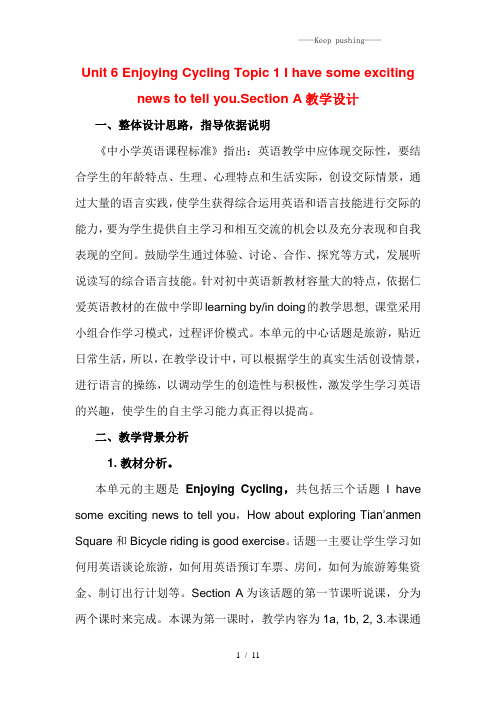
Unit 6 Enjoying Cycling Topic 1 I have some exciting news to tell you.Section A教学设计一、整体设计思路,指导依据说明《中小学英语课程标准》指出:英语教学中应体现交际性,要结合学生的年龄特点、生理、心理特点和生活实际,创设交际情景,通过大量的语言实践,使学生获得综合运用英语和语言技能进行交际的能力,要为学生提供自主学习和相互交流的机会以及充分表现和自我表现的空间。
鼓励学生通过体验、讨论、合作、探究等方式,发展听说读写的综合语言技能。
针对初中英语新教材容量大的特点,依据仁爱英语教材的在做中学即learning by/in doing的教学思想, 课堂采用小组合作学习模式,过程评价模式。
本单元的中心话题是旅游,贴近日常生活,所以,在教学设计中,可以根据学生的真实生活创设情景,进行语言的操练,以调动学生的创造性与积极性,激发学生学习英语的兴趣,使学生的自主学习能力真正得以提高。
二、教学背景分析1. 教材分析。
本单元的主题是Enjoying Cycling,共包括三个话题I have some exciting news to tell you,How about exploring Tian’anmen Square和Bicycle riding is good exercise。
话题一主要让学生学习如何用英语谈论旅游,如何用英语预订车票、房间,如何为旅游筹集资金、制订出行计划等。
Section A为该话题的第一节课听说课,分为两个课时来完成。
本课为第一课时,教学内容为1a, 1b, 2, 3.本课通过让学生掌握旅游地点、交通方式和所需费用等常识,掌握单词field, proper,mount, vehicle, airline和句式How much does it cost to get to … by …? It costs …/ How long does it take to get to …by …? It takes … to get there by …. 由于海南的学生对哈尔滨,香山和九寨沟不甚了解,因此,在设计旅游活动时,我把景点换成学生比较熟悉的假日海滩,火山口,万泉河和三亚南山,同时引导学生学会制订合理的出行计划;培养学生热爱旅游、积极探索的态度。
2023年仁爱版八年级英语下册Unit 6 Enjoy cycling Topic 3 Bicycl
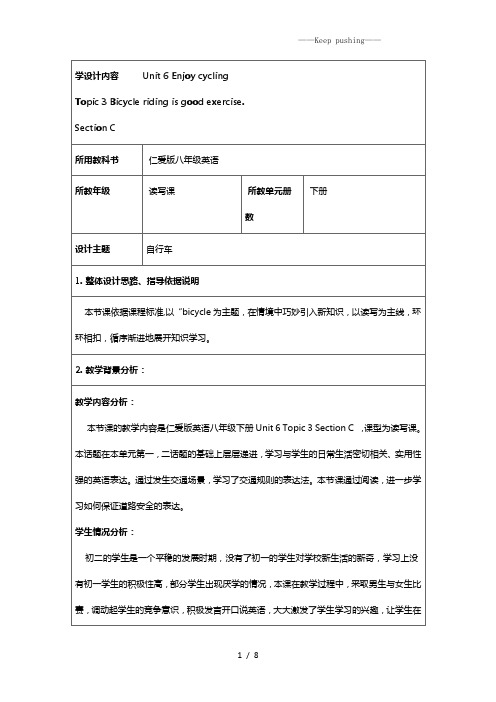
板书设计:Unit 6 Enjoy Cycling
Topic 3 Bicycle riding is good exercise. Section C
safety rules
pay attention to
in case of
in a word
You should …
You shouldn’t …
教学难点。
本节课还有一些需要改进之处:
1、时间分配需要更合理。
由于引入和练习环节稍超出预设范围,为使教学时间不超时,在后面讨论环节,未能让更多学生畅谈,深感遗憾。
2、在教学过程中,语度有些快,影响学生的理解,所以我在今后的教学中,应注意这些细节的处理。
教师的职务是‘千教万教,教人求真’;学生的职务是‘千学万学,学做真人’。
我们发现了儿童有创造力,认识了儿童有创造力,就须进一步把儿童的创造力解放出来。
——好词好句。
2015春仁爱版英语八年级下Unit6Enjoy Cycling Topic_3知识点

Unit6 Enjoying CyclingTopic3 Bicycle riding is good exercise.重点句子Section A1.I think traffic in Beijing is crazy. 我认为北京的交通很糟。
crazy在句中意为“拥挤”,故traffic is crazy意为“交通拥挤”,相当于traffic is heavy/busy/ t errible。
如:In some big cities, traffic is crazy. 在一些大城市,交通很拥挤。
而crazy本意是“不理智的,疯狂的,愚蠢的,傻的”。
如: Are you crazy? 你疯了?She must be crazy to lend him money. 把钱借给他,她一定是疯了。
拓展:be crazy about sth. 意为“热衷于”,be crazy about sb. 意为“迷恋,爱上”。
Rick is crazy about football. 瑞克十分热衷于足球。
He was crazy about her. 他爱上她了。
2.When I first arrived, I was afraid of riding my bike anywhere.当我刚开来时,在哪儿都不敢骑自行车。
(1)“anywhere”表示“任何地方”时,可用于肯定句。
如:An accident can happen anywhere. 任何地方都可能发生事故。
【链接】everywhere “到处,处处”=here and there常用于肯定句中。
否定句和疑问句中的anywhere则来代替somewhere(某地)。
如:He follows me everywhere. 我无论去哪他都跟着我。
Did you go anywhere interesting? 你去过什么有趣的地方吗?汉译英:Jeff到处找他的钥匙,但哪儿(anywhere)都找不到。
英语:unit 6《enjoying cycling》topic 2 section a and b教案(1)(仁爱英语八年级下).doc
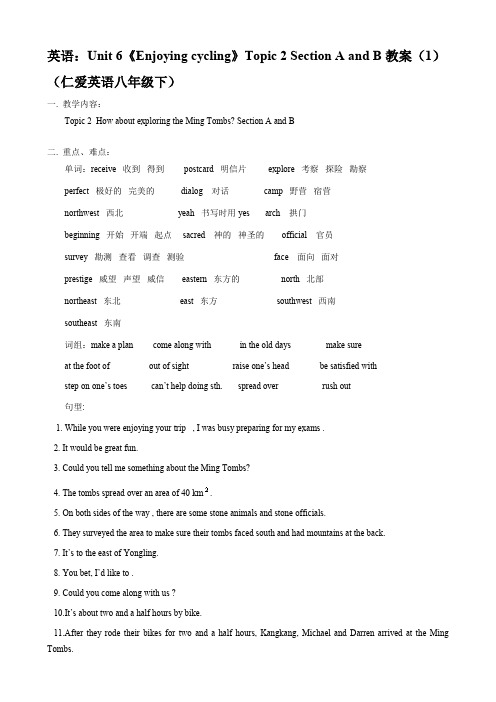
英语:Unit 6《Enjoying cycling》Topic 2 Section A and B教案(1)(仁爱英语八年级下)一. 教学内容:Topic 2How about exploring the Ming Tombs? Section A and B二. 重点、难点:单词:receive 收到得到postcard 明信片explore 考察探险勘察perfect 极好的完美的dialog 对话camp 野营宿营northwest 西北yeah 书写时用yes arch 拱门beginning 开始开端起点sacred 神的神圣的official 官员survey 勘测查看调查测验face 面向面对prestige 威望声望威信eastern 东方的north 北部northeast 东北east 东方southwest 西南southeast 东南词组:make a plan come along with in the old days make sureat the foot of out of sight raise one’s head be satisfied withstep on one’s toes can’t help doing sth.spread over rush out句型:1. While you were enjoying your trip , I was busy preparing for my exams .2. It would be great fun.3. Could you tell me something about the Ming Tombs?4. The tombs spread over an area of 40 km.5. On both sides of the way , there are some stone animals and stone officials.6. They surveyed the area to make sure their tombs faced south and had mountains at the back.7. It’s to the east of Yongling.8. You bet, I’d like to .9. Could you come along with us ?10.It’s about two and a half hours by bike.11.After they rode their bikes for two and a half hours, Kangkang, Michael and Darren arrived at the Ming Tombs.语法:时间状语从句及动词不定式三. 具体内容:when , while asuntil not…untilafter从句的时态:1. 当主句为一般过去时时,从句常用过去的某种时态.2. 当主句为一般将来时时,从句用一般现在时态.动词不定式做状语通常表达三种意义:目的,原因,结果。
仁爱版英语八年级下册教案Unit-6-Enjoying-cycling

仁爱版英语八年级下册教案Unit 6 Enjoying cyclingTopic 1 We’re going on a three-day visit to Mount Tai.教学内容分析及课时分配建议:本话题围绕一次春游活动而展开。
主要内容包含:选择目的地、制定出游计划、选择交通工具、预订车票、预订房间、筹集经费、记录经历。
所有活动都与春游活动息息相关。
在进行这些活动时,逐步展开动词不定式的学习。
通过学习本单元,可以培养学生独立自主的能力和合作的意识。
本话题建议用5个课时来完成:第一课时:Section A-1a, 1b, 2, 3第二课时:Section A-4,Section B-1a,1b,1c第三课时:Section B-2, 3, 4, Section C-2第四课时:Section C-3a, 3b, 1a, 1b, 1c第五课时:Section D-Grammar and Functions, 1a, 1b, 2, Project第一课时 (Section-A 1a,1b,2,3 )教学设计思路:本课时主要是引入春游这个话题和动词不定式。
首先通过简练的英语谚语引入动词不定式,通过活动来感知新语法知识。
然后引入话题,学习1a ,1b 和2。
最后通过对子活动来谈论自己的出游计划,巩固句型和语法。
Ⅰ. Teaching aims1.Knowledge aims:(1)学习动词不定式的用法。
(2)复习询问价格、时间、原因等问句。
2.Skill aims:(1)能够听懂含有不定式的对话。
(2)能够用不定式来谈论价格、时间等。
(3)能够制定出游计划。
3.Emotional aims:培养学生的合作意识。
4.Culture awareness:Ⅱ. The key points and difficult points1.Key points:(1)Words and expressions : field, proper, price ,total ,mount, vehicle, airline (2)Sentences: We are going on a three-day visit to Mount Tai.It’s too far to cycle.I’d love to go by plane.We will decide on the best way to travel on our field trip. 2.Difficult points:理解动词不定式在句子中的不同成分。
仁爱版八年级英语下册Unit6EnjoyingCyclingTopic2SectionB教学设计
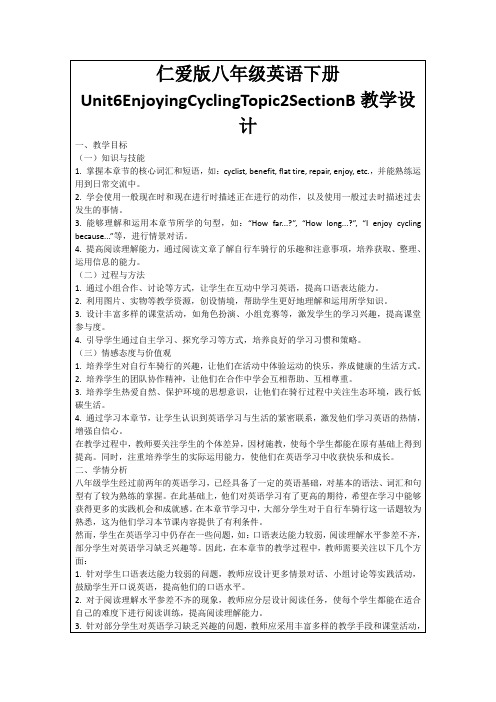
-通过信息图表、思维导图等工具,帮助学生整理和归纳阅读材料中的信息。
-组织小组讨论,鼓励学生分享自己的阅读心得,提高他们的批判性思维能力。
4.在教学过程中,我还将注重:
-个性化教学,关注每个学生的学习需求和进步,提供个别指导和支持。
-创设积极的学习氛围,鼓励学生勇于尝试,不怕犯错误,培养他们的自主学习能力。
2.利用图片、实物等教学资源,创设情境,帮助学生更好地理解和运用所学知识。
3.设计丰富多样的课堂活动,如角色扮演、小组竞赛等,激发学生的学习兴趣,提高课堂参与度。
4.引导学生通过自主学习、探究学习等方式,培养良好的学习习惯和策略。
(三)情感态度与价值观
1.培养学生对自行车骑行的兴趣,让他们在活动中体验运动的快乐,养成健康的生活方式。
- How can we make cycling safer and more enjoyable for everyone?
要求:用英文进行讨论,记录下讨论过程中的关键点。
-自行车骑行的基本常识;
-自行车骑行的安全注意事项;
-邀请他人一起参与自行车骑行的口号。
要求:设计新颖,英文表达准确,至少使用三种不同的时态。
3.观看一段关于自行车骑行的英文视频,并完成以下任务:
-概括视频的主要内容;
-记录视频中出现的至少五个本节课所学的词汇和短语;
-选取视频中一个场景,用所学的时态进行口头描述。
-定期进行形成性评价,了解学生的学习情况,及时调整教学策略,确保教学效果。
四、教学内容与过程
(一)导入新课
在本环节中,我将采用情境导入法,激发学生的学习兴趣。首先,向学生展示一组自行车骑行的图片,包括城市骑行、山地骑行、长途骑行等,引导学生观察并思考以下问题:
仁爱版八年级英语下册Unit6EnjoyCyclingTopic2SectionC说课稿
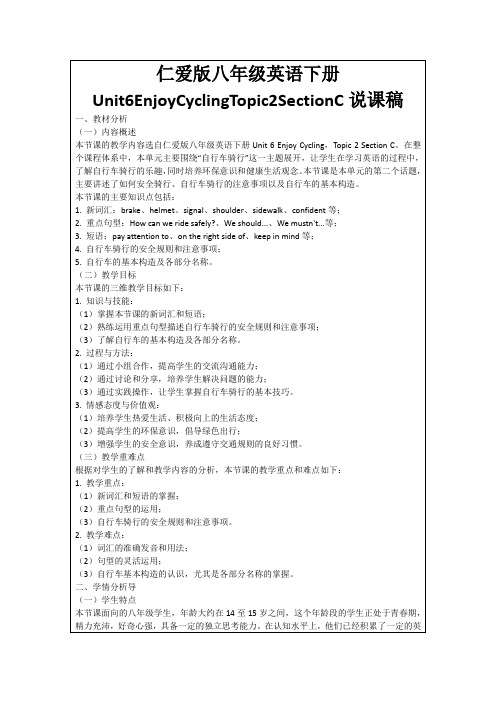
1.词汇量有限,影响阅读理解;
2.口语表达能力不足,导致课堂互为了激发学生的学习兴趣和动机,我将采取以下策略或活动:
1.创设情境,让学生在真实的语境中运用所学知识,提高他们的学习兴趣;
2.设计丰富多样的课堂活动,如小组讨论、角色扮演、互动游戏等,增强学生的参与感和合作意识;
1.师生互动:通过提问、讲解、示范等方式,引导学生积极参与课堂讨论,及时给予反馈,帮助学生解决问题。
2.生生互动:
(1)小组讨论:让学生分组讨论自行车骑行的安全规则和注意事项,促进他们之间的交流合作;
(2)角色扮演:让学生模拟实际情境,进行角色扮演,锻炼他们的口语表达能力;
(3)互动游戏:设计课堂互动游戏,让学生在游戏中学习,提高他们的学习兴趣和积极性。通过以上互动方式,促进学生的参与和合作,提高课堂教学效果。
(2)通过讨论和分享,培养学生解决问题的能力;
(3)通过实践操作,让学生掌握自行车骑行的基本技巧。
3.情感态度与价值观:
(1)培养学生热爱生活、积极向上的生活态度;
(2)提高学生的环保意识,倡导绿色出行;
(3)增强学生的安全意识,养成遵守交通规则的良好习惯。
(三)教学重难点
根据对学生的了解和教学内容的分析,本节课的教学重点和难点如下:
3.合作学习法:鼓励学生进行小组合作,共同完成学习任务,培养他们的团队协作能力和沟通能力。这种方法的理论依据是社会建构主义,强调学习过程中的社会互动。
(二)媒体资源
在本节课中,我将使用以下教具、多媒体资源和技术工具:
1.教具:自行车模型、单词卡片、挂图等,用于直观展示自行车构造和单词,帮助学生更好地理解教学内容。
应对措施:
1.针对新词汇和句型,设计丰富的巩固练习,帮助学生加强记忆;
- 1、下载文档前请自行甄别文档内容的完整性,平台不提供额外的编辑、内容补充、找答案等附加服务。
- 2、"仅部分预览"的文档,不可在线预览部分如存在完整性等问题,可反馈申请退款(可完整预览的文档不适用该条件!)。
- 3、如文档侵犯您的权益,请联系客服反馈,我们会尽快为您处理(人工客服工作时间:9:00-18:30)。
仁爱科普版八年级下Unit 6 Enjoying CyclingTopic 1 I have some exciting newsto tell you.同步练习C卷姓名:________ 班级:________ 成绩:________一、单项选择。
(共10题;共20分)1. (2分)Does Tom want ______ the tigers and elephants?A . to seeB . seeC . seeingD . sees2. (2分)— She was in great ______ after she broke her leg.— We should do something _________ her relaxed.A . danger; to makeB . danger; makingC . pain; to makeD . pain; making3. (2分)The girl won the champion again. She is only ________ girl!A . an 18-years-oldB . a 18 years oldC . an 18-year-oldD . a 18-year-olds4. (2分)We can't work out the physics problem. Can you tell us________?A . how to doB . what to do itC . how to do itD . what should to do5. (2分)— How's it going, Betty?— ________.A . Thank youB . TerribleC . Very muchD . You're right6. (2分)The box is ____heavy for me ____.A . so, to carry itB . too, to carry itC . too, to carryD . so, that I can't carry7. (2分)It's very hot today. What about to swim?A . goingB . goC . to goD . to going8. (2分)— When shall we meet again next week?— ______ day is possible. I'm free the whole week.A . EitherB . NeitherC . EveryD . Any9. (2分)—What does she____in the email?—She wants an MP4.A . writeB . sayC . seeD . buy10. (2分)It's said that the water in that lake is _______ for us _______.A . too clean; to drinkB . enough clean; to drinkC . so clean; to drinkD . clean enough; to drink二、情景交际。
(共1题;共5分)11. (5分)根据对话内容,从方框中选择恰当的选项补全对话,其中有两项多余。
A: Hey, Linda. I' m not working today.B: Oh. ________A: I' m having brunch (早午餐) with some friends.B: ________Brunch is a great meal.A: It's part (部分的) breakfast.B: And part lunch! ________A: Yeah, you're right. I meet my friends for brunch every month.B: What do you talk about at brunch?A: Well, we usually just catch up on (了解) each other's news. ________B: That's nice. It's good to share with friends.A: Yes. I enjoy spending time with my friends. ________B: It's important to have good friends.A: Yes. And it's always nice to have a good meal with friends!12. (10分)完形填空。
Breakfast is very important. It is one of the most important1of the day. To keep healthy, everyone should2a good breakfast.3the right food is necessary for good health. We may have eggs, bread, milk and so on,4breakfast. Many students go to school without breakfast5they get up late or their parents don't cook for them. It's6for their health.7breakfast children may not grow fast and may not study and play very well at school. They may8. And when they're ill, they will9a long time in recovering (恢复). I thinkeveryone should have some good10habits. It is necessary.(1)A . mealB . mealsC . food(2)A . to haveB . haveC . has(3)A . EatingB . EatsC . Eat(4)A . inB . onC . for(5)A . becauseB . soC . but(6)A . goodB . badC . better(7)A . WithoutB . WithC . Not have(8)A . illB . are illC . be ill(9)A . spendB . takeC . make(10)A . healthB . healthyC . bad四、阅读理解。
(共2题;共20分)13. (10分)阅读理解( B )In China, many people like watching TV. Watching TV is one of the must important activities of the day. TV brings the outside closer(close adv.接近地) to people's homes. Some people say the world is smaller than before — because of TV.What's going on (发生) in the other countries? How do people love in places far away? Is there a good sports game somewhere? What's life in the deepest part of the sea?If you want to answer these and other kinds of questions. just turn on the TV. Turn it on and watch. You can see a lot and learn a lot. Of course, people can also learn through reading of listening to the radio. But with TV they can learn better and much easily. Why? Because they can hear and watch, too.TV helps to open our eyes. TV also helps to open our minds. TV often gives us new ideas. We learn newer and better ways of doing something.(1)Some people say the world is smaller than before because .A . TV makes the earth smaller and smallerB . all people like to watch TVC . watching TV is one of the most important activities of the dayD . TV brings the outside world closer to people(2)We can when we watch TV.A . go to live in the other countriesB . answer TV many questionsC . get a lot of informationD . ask TV some questions(3)People learn better through TV than radio because .A . TV sets are bigger than radiosB . people can not only hear but also watchC . without TV people can't open their eyesD . it's easier to turn on TV than to turn on the radio(4)The sentence “TV also helps to open our minds' means .A . our minds can not only be opened by TVB . something is wrong with our mindsC . we can learn more with TV than without TVD . TV is new to us(5)This article has told us .A . it's good to watch TVB . not to watch TV any moreC . students shouldn't watch TV at any timeD . to stop reading to watch TV14. (10分)Is there someone you hate? Well, maybe you don't really hate them. Butyou get really angry every time you think of them. If you don't let this anger go, it can turn into bitterness(痛苦)Bitterness appears when we can't forgive(原谅) someone who has hurt us or made us angry. Someone might say or do something that hurts us. But Instead of controlling the anger, we keep it deep inside. Before long, a bitter feeling begins to grow. We may think we're hurting that person by criticizing him or her often, but we're really only hurting ourselves.Bitterness can not only lead to serious health problems such as heart disease, but also hurt our relationships with friends and family members. No one enjoys being around an anger person for very long.If you see bitterness in your life, here are some ways to deal with it.Accept itInstead of trying to deny your anger, make it clear to yourself and accept it. See your anger forwhat it is and quickly deal with it.Stop making excuses for itYou may feel you have a right to be anger. You may think you're right and the other person is wrong. You may even secretly enjoy making the other person look bad. But in the end, bitterness hurts you much more than the other person. The bitterness will hold you back, and the other person will go on with his or her life.Forgive and forget itYou probably can't completely put the anger out of your mind. But you can decide to forgive the other person. Forget it and move on. You'll enjoy better health and peace of mind.阅读上面的短文,从每题所给的四个选项中,选出一个最佳答案(1)According to the passage, we might get angry when someone ______.bitterness comes from_______.A . holds us backB . forgets usC . doesn't like usD . does hurt us(2)bitterness comes from_______.A . our health problems like heart diseaseB . the anger that lives deep inside our mindC . the person who says something that hurts usD . our relation with friends and family members(3)The underlined word "deny”"in the passage means "_____"A . 误解B . 否认C . 疏远D . 减轻(4)The best way to deal with the bitterness is to ______.A . make the person who hurts us look badB . hate the person who hurts us very oftenC . accept that you are hurting the other personD . forgive the person who hurts us and forget it(5)What can we learn from the passage?A . We should enjoy someone who hurts us.B . We should pay more attention to our friends.C . The peace of mind is more important than the hurt itself.D . It’s better to let bitterness go along with the other person.五、词汇部分。
